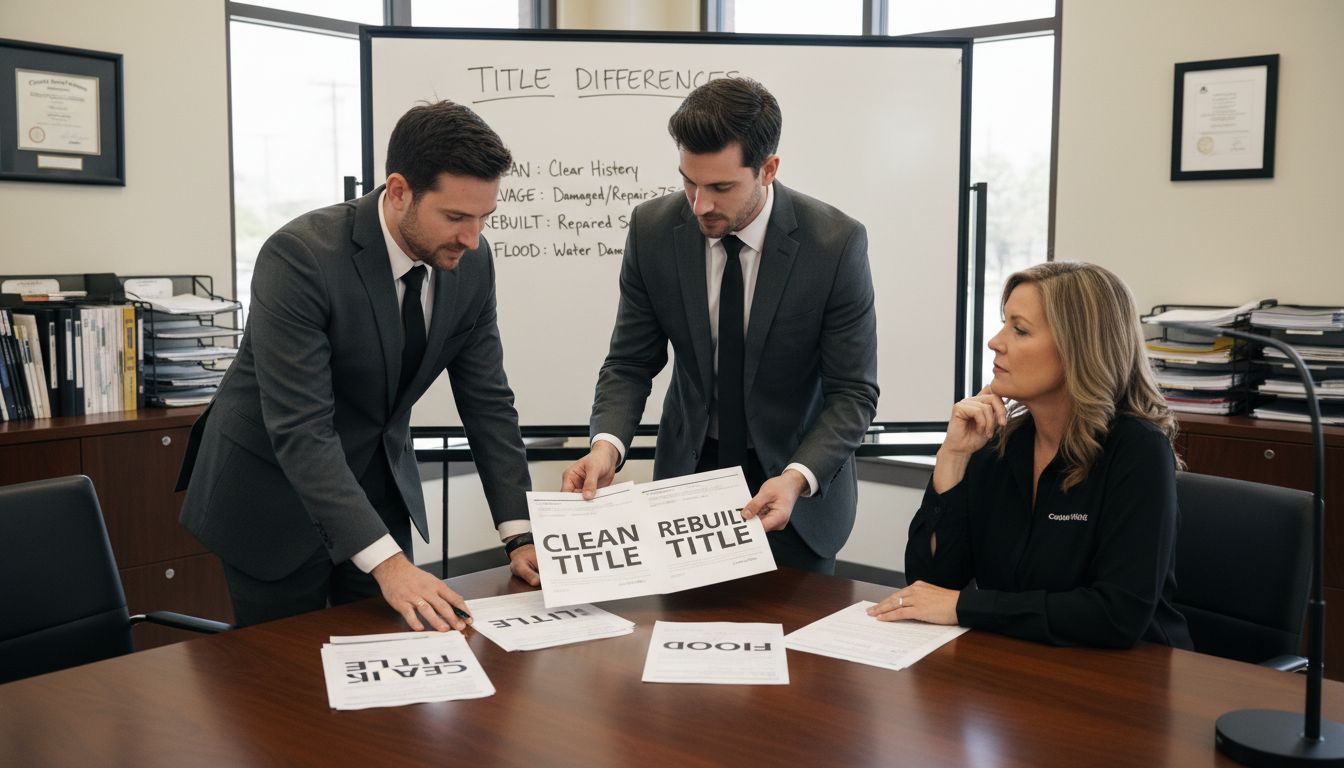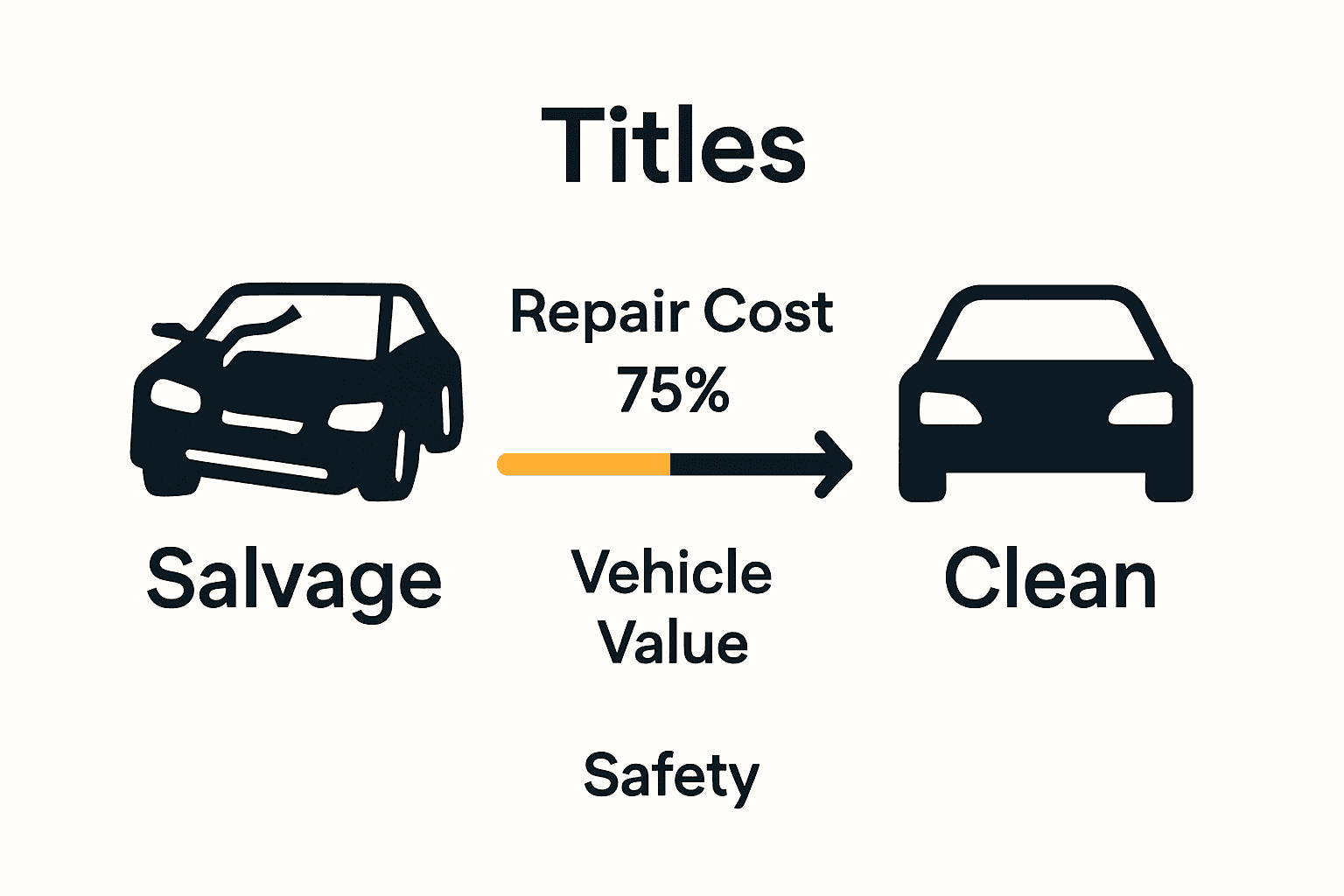Does Structural Damage Mean Salvage Title? Complete Guide
November 11, 2025
Nearly one in five used vehicles on the market has some form of undisclosed damage in its history. Buying or selling a car with structural issues carries serious risks, not just for your wallet but also for your safety and peace of mind. Understanding how structural damage impacts a vehicle’s title status gives you the knowledge to avoid costly surprises and make smarter decisions when it comes to your next car.
Table of Contents
- What Structural Damage Means for Vehicle Titles
- Key Differences Between Title Types
- How Insurance Companies Determine Title Status
- Buying and Selling Cars With History Information
- Common Myths and Buyer Mistakes to Avoid
Key Takeaways
| Point | Details |
|---|---|
| Structural Damage Impacts Title | Significant structural damage can lead to a salvage title if declared a total loss, but not all damage results in this classification. |
| Understanding Title Types | Car titles vary and indicate a vehicle’s history; knowing these can influence financial and safety decisions. |
| Insurance’s Role | Insurance companies assess damage and repair costs to determine title status, emphasizing the need for thorough evaluations. |
| Informed Buying Practices | Buyers should conduct due diligence, including obtaining vehicle history reports and professional inspections, to mitigate risks associated with vehicles having complex histories. |
What Structural Damage Means for Vehicle Titles
Structural damage represents significant harm to a vehicle’s fundamental framework that can potentially impact its title status. According to Edmunds, structural damage might trigger a salvage title designation if the damage is severe enough for an insurance company to declare the car a total loss.
Not every instance of structural damage automatically results in a salvage title. The extent and severity of the damage play crucial roles in determining whether a vehicle will receive this classification. VIN Free Check highlights that some vehicles with structural damage might retain a clean title if the damage was not reported or disclosed, underscoring the importance of comprehensive vehicle inspections.
Key indicators of significant structural damage include:
- Visible frame misalignment
- Uneven suspension performance
- Compromised structural integrity
- Extensive welding or panel replacement
Potential consequences of substantial structural damage extend beyond title classification. These damages can seriously compromise vehicle safety, handling, and long-term performance. Buyers should always conduct thorough professional inspections and obtain detailed vehicle history reports before purchasing any vehicle with potential structural issues.
While a structural damage report doesn’t automatically mean a salvage title, it signals the need for careful evaluation. Understanding the nuanced relationship between damage and title status empowers buyers to make informed decisions. Understanding What is Frame Damage in Cars provides additional insights into recognizing and assessing potential structural complications.
Key Differences Between Title Types
Understanding vehicle titles is crucial for making informed purchasing decisions. Mercury Insurance explains that car titles come in several distinct categories, each revealing critical information about a vehicle’s history and condition.
Clean Titles represent vehicles with no major damage history, while Salvage Titles indicate a vehicle that was severely damaged and declared a total loss by an insurance company. According to Chase, these titles reflect different stages of a vehicle’s lifecycle and potential risks.
Here’s a breakdown of the most common title types:
- Clean Title: Vehicle with no significant damage history
- Salvage Title: Vehicle declared a total loss due to severe damage
- Rebuilt Title: Previously salvaged vehicle repaired and passed inspection
- Bonded Title: Vehicle with incomplete ownership documentation
- Flood/Water Damage Title: Vehicle with significant water-related damage
The implications of these different title types extend far beyond paperwork. Each classification carries potential financial and safety considerations that buyers must carefully evaluate. A title isn’t just a document - it’s a roadmap of a vehicle’s past that can significantly impact its future value, insurability, and overall reliability.

To navigate these nuanced distinctions effectively, buyers should always request comprehensive vehicle history reports and consider professional inspections. The Difference Between a Salvage Title and a Rebuilt Title provides additional insights into understanding these critical automotive distinctions.
How Insurance Companies Determine Title Status
Insurance companies play a critical role in determining a vehicle’s title status through a comprehensive assessment process that evaluates the extent of damage and potential repair costs. When a vehicle sustains significant damage, insurers conduct a meticulous evaluation to decide whether the car should be classified as salvage, rebuilt, or remain under a clean title.
The primary factor in title determination is the repair cost threshold. National Highway Traffic Safety Administration indicates that many states consider a vehicle a total loss when repair costs exceed approximately 75% of its pre-damage value. This crucial percentage helps insurers make consistent decisions about a vehicle’s future.
Key factors insurance companies consider when determining title status include:

- Total repair cost compared to vehicle’s pre-damage value
- Extent of structural and mechanical damage
- Safety implications of potential repairs
- Vehicle’s age and overall condition
- Potential for complete structural rehabilitation
The title status determination is not just a paperwork exercise but a critical safety assessment. Insurance companies aim to protect consumers by ensuring that severely damaged vehicles either undergo comprehensive repairs or are removed from roadways. This process helps maintain automotive safety standards and provides transparency for potential buyers.
Navigation of these complex title classifications can be challenging for consumers. Does a Rebuilt Title Affect Insurance? offers additional insights into understanding the intricate relationship between vehicle damage, insurance, and title status.
Buying and Selling Cars With History Information
Navigating the complex world of vehicle purchases requires a strategic approach, especially when dealing with cars that have unique history information. VIN Free Check emphasizes that sellers are legally obligated to disclose known structural damage, making transparency crucial in the buying and selling process.
Buyers must conduct thorough due diligence before finalizing any vehicle transaction. Edmunds warns that purchasing vehicles with complicated histories carries significant risks, including potential safety issues and insurance complications. This means going beyond surface-level inspections and digging deeper into the vehicle’s complete background.
Key steps for protecting yourself when buying or selling a car with history information include:
- Obtain a comprehensive vehicle history report
- Request professional mechanical inspection
- Verify all disclosed damage and repair information
- Understand the implications of different title statuses
- Compare market values for vehicles with similar histories
Transparency is the foundation of any successful vehicle transaction. Sellers who provide complete, honest information build trust, while buyers who invest time in research protect themselves from potential future complications. The goal is not just to complete a transaction, but to ensure both parties feel confident about the vehicle’s condition and value.
For those looking to dive deeper into vehicle history investigations, How to Check VIN History offers additional strategies for uncovering critical information about a vehicle’s past.
Common Myths and Buyer Mistakes to Avoid
Vehicle history can be complex and misleading, especially when it comes to structural damage and title status. VIN Free Check reveals a critical myth: not all vehicles with structural damage automatically receive a salvage title. This misconception can lead buyers to make uninformed decisions.
Car Arac warns that assuming a clean title guarantees a vehicle’s perfect condition is a dangerous mistake. Some cars with frame damage might retain a clean title through title washing or incomplete damage reporting, making independent verification crucial.
Common myths and mistakes to watch out for include:
- Believing a clean title means zero damage history
- Skipping professional vehicle inspections
- Assuming all structural damage results in a salvage title
- Not requesting comprehensive vehicle history reports
- Overlooking potential hidden repair costs
- Failing to understand the long-term implications of previous damage
Navigating the used car market requires skepticism and thorough research. Buyers should always approach vehicle purchases with a critical eye, understanding that paperwork and titles only tell part of the story. Professional inspections, detailed history reports, and careful examination are your best defense against potential costly mistakes.
For those looking to arm themselves with more knowledge, The Top 5 Myths About Rebuilt Title Cars offers additional insights into avoiding common misconceptions in the automotive marketplace.
Explore the Value Behind Structural Damage and Rebuilt Titles with ReVroom
If you just finished reading about how structural damage relates to vehicle titles you probably see how complex this topic really is. The article dove into key points like salvage titles versus rebuilt titles and how insurance companies decide a vehicle’s fate. We know that buyers want transparency, trustworthy information, and a straightforward way to find smart vehicle options without getting lost in confusing jargon or hidden risks.

That is exactly why ReVroom exists. We specialize in rebuilt title vehicles that have been repaired and restored to safe, drivable condition backed by clear photos and detailed accident history in every listing. Instead of guessing whether a car with structural damage is a smart buy you can see its full story before you spend one hundred fifty dollars or more on inspections and reports. With our emphasis on honesty and buyer protection you can confidently navigate options avoiding costly mistakes and unsafe rides. Ready to see how far your dollar goes when you buy rebuilt vehicles the smart way? Visit ReVroom now to check out the listings and get the transparency you deserve. For more clarity on rebuilt titles and vehicle history check out How to Check VIN History and The Difference Between a Salvage Title and a Rebuilt Title to empower your next car purchase.
Frequently Asked Questions
What is structural damage in a vehicle?
Structural damage refers to significant harm to a vehicle’s fundamental framework that affects its safety and performance.
Does every instance of structural damage result in a salvage title?
No, not every instance of structural damage leads to a salvage title. The degree of damage and repair costs are critical factors in the determination.
How can buyers assess if a vehicle with structural damage has a salvage title?
Buyers should conduct thorough inspections and obtain detailed vehicle history reports to evaluate the title status and any reported damage.
What are the implications of buying a vehicle with structural damage?
Buying a vehicle with structural damage can pose risks, including compromised safety and potential long-term performance issues, making careful evaluation essential.
